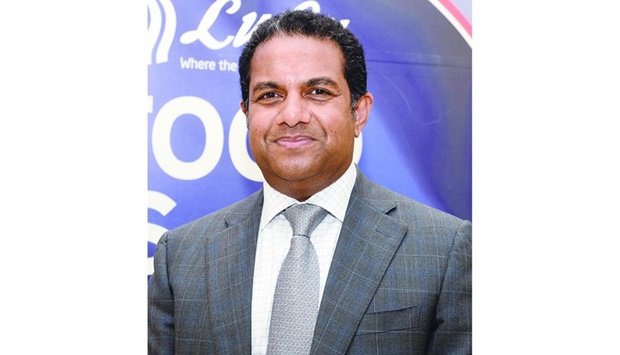A major hypermarket chain in Qatar will establish the country’s first robotic fulfilment centre as part of plans to offer fully-automated services and solutions for consumers here, according to a top official.
“LuLu is also now almost in the final stages of negotiations with one of the most advanced, cutting-edge robotics companies in Europe. We want to make this first robotic fulfilment centre in Qatar,” said Dr Mohamed Althaf, director, LuLu Group International.
Speaking to Gulf Times, Althaf said the fully-automated facility is expected to be completed before the 2022 FIFA World Cup. The project was borne out of LuLu’s digital transformation strategy, he stressed.
“LuLu has been quick to adapt to the needs of the market since the 2017 Gulf crisis and, especially, during the Covid-19 pandemic. We have added more delivery vehicles and we are upgrading our digital platforms almost on a monthly basis.
“But we know that this is not sufficient to keep pace with whatever is happening in the market, so right now we are going for fully-automated, robotic solutions. We have already identified a space along Salwa Road. We are also in negotiations for a location in the Qatar Free Zones,” Althaf explained.
He said the digital transformation of the business is LuLu’s largest project in Qatar this year. The company is targeting that at least 20% to 25% of its transactions should be through e-commerce and omnichannel platforms. Althaf said he believes the move would even support and complement LuLu’s brick-and-mortar services.
“LuLu is not a digital-native company, so we are not only focusing on e-commerce. It’s about being omnichannel. Other than ‘last minute delivery’, we are also looking at ‘curbside delivery’, ‘order-from-home and pick-up from store’, and other solutions. We are working with some of the world’s leading cutting-edge solution providers to achieve this,” he pointed out.
Althaf said the facility has a scalable model, giving it sufficient room for expansion in the future. Also, the project aims to address key issues, such as the picking speed for items ordered by customers.
“Currently, our picking speed is a major challenge, which is why we are building an automated shopping assistant to better improve our picking speed by 40% to 50%. And because this facility is fully-automated, we can refocus and maximise our manpower to other essential operational tasks,” he emphasised.
Althaf noted that around 10 to 15 years ago, the grocery and retail industry, including consumers, were slow to adapt to digitalisation. However, the Gulf crisis and the pandemic accelerated Qatar’s digital transformation “10 times faster than what was anticipated,” he said.
“There were a couple of things that we understood from these challenges. The first one is scalability, while the second is that economic headwinds offer opportunity and a sense of urgency. We also realised that digital transformation is essential for our business,” Althaf added.
“LuLu is also now almost in the final stages of negotiations with one of the most advanced, cutting-edge robotics companies in Europe. We want to make this first robotic fulfilment centre in Qatar,” said Dr Mohamed Althaf, director, LuLu Group International.
Speaking to Gulf Times, Althaf said the fully-automated facility is expected to be completed before the 2022 FIFA World Cup. The project was borne out of LuLu’s digital transformation strategy, he stressed.
“LuLu has been quick to adapt to the needs of the market since the 2017 Gulf crisis and, especially, during the Covid-19 pandemic. We have added more delivery vehicles and we are upgrading our digital platforms almost on a monthly basis.
“But we know that this is not sufficient to keep pace with whatever is happening in the market, so right now we are going for fully-automated, robotic solutions. We have already identified a space along Salwa Road. We are also in negotiations for a location in the Qatar Free Zones,” Althaf explained.
He said the digital transformation of the business is LuLu’s largest project in Qatar this year. The company is targeting that at least 20% to 25% of its transactions should be through e-commerce and omnichannel platforms. Althaf said he believes the move would even support and complement LuLu’s brick-and-mortar services.
“LuLu is not a digital-native company, so we are not only focusing on e-commerce. It’s about being omnichannel. Other than ‘last minute delivery’, we are also looking at ‘curbside delivery’, ‘order-from-home and pick-up from store’, and other solutions. We are working with some of the world’s leading cutting-edge solution providers to achieve this,” he pointed out.
Althaf said the facility has a scalable model, giving it sufficient room for expansion in the future. Also, the project aims to address key issues, such as the picking speed for items ordered by customers.
“Currently, our picking speed is a major challenge, which is why we are building an automated shopping assistant to better improve our picking speed by 40% to 50%. And because this facility is fully-automated, we can refocus and maximise our manpower to other essential operational tasks,” he emphasised.
Althaf noted that around 10 to 15 years ago, the grocery and retail industry, including consumers, were slow to adapt to digitalisation. However, the Gulf crisis and the pandemic accelerated Qatar’s digital transformation “10 times faster than what was anticipated,” he said.
“There were a couple of things that we understood from these challenges. The first one is scalability, while the second is that economic headwinds offer opportunity and a sense of urgency. We also realised that digital transformation is essential for our business,” Althaf added.


